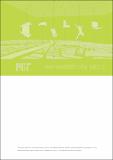Human mobility prediction based on individual and collective geographical preferences
Author(s)
Calabrese, Francesco; Di Lorenzo, Giusy; Ratti, Carlo
DownloadRatti_Human mobility.pdf (486.4Kb)
OPEN_ACCESS_POLICY
Open Access Policy
Creative Commons Attribution-Noncommercial-Share Alike
Terms of use
Metadata
Show full item recordAbstract
Understanding and predicting human mobility is a crucial component of transportation planning and management. In this paper we propose a new model to predict the location of a person over time based on individual and collective behaviors. The model is based on the person's past trajectory and the geographical features of the area where the collectivity moves, both in terms of land use, points of interests and distance of trips. The effectiveness of the proposed prediction model is tested using a massive mobile phone location dataset available for the Boston metropolitan area. Experimental results show good levels of accuracy in terms of prediction error and prove the advantage of using the collective behavior in the prediction model.
Date issued
2010-09Department
Massachusetts Institute of Technology. Department of Urban Studies and Planning; Massachusetts Institute of Technology. SENSEable City LaboratoryJournal
Proceedings of the 13th International IEEE Conference on Intelligent Transportation Systems
Publisher
Institute of Electrical and Electronics Engineers (IEEE)
Citation
Calabrese, Francesco, Giusy Di Lorenzo, and Carlo Ratti. “Human Mobility Prediction Based on Individual and Collective Geographical Preferences.” 13th International IEEE Conference on Intelligent Transportation Systems (September 2010).
Version: Author's final manuscript
ISBN
978-1-4244-7657-2
ISSN
2153-0009